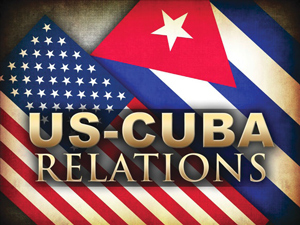Cuba: A history of resistance and U.S. meddling (FCN, 12-26-2014)

UNITED NATIONS (FinalCall.com) – “I’d like to thank President Barack Obama of the United States and President Raul Castro for taking this very important step towards normalizing relations,” UN Secretary-General Ban Ki-Moon told reporters during his year ending press conference at UN headquarters in New York on December 17.
Mr. Ban said that in light of the fact that the 193-member UN General Assembly had emphasized through years of resolutions that the international community wanted the two nations to normalize their bilateral relations, he personally “welcomed” the news.
In the corridors of the UN, the news that Pres. Obama and Pres. Castro said they would normalize their relations was met with cautious optimism. A delegate from Spain, Ambassador Jose Manuel Garcia, urged Havana to step up its reforms and called on Cuba to sign international human rights agreements.
The U.S. ambassador to the UN, Samantha Powers tweeted: “Best way to counter #Cuba’s one-party rule is by betting on the Cuban people. Cuban civil society will be at the heart of our engagements.”
“This is a bilateral relationship, so it really is left to the respective governments to move forward,” explained Deputy Spokesman to the secretary-general, Farhan Haq in an email to The Final Call.
When pressed to further describe what actions UN agencies would take going forward to aid both nations, he said: “UN agencies will continue to work with Cuba, as they do already. If we can help with the relationship, we would be ready to do so.”
Bill Fletcher, Jr. a racial justice, international human rights and labor activist told The Final Call that the news of the thaw in relations between Havana and Washington was “a victory for the Cuban people, who have withstood 50-plus years of an economic siege.”
However, Mr. Fletcher said it was an “incomplete” victory due to the fact that it would take an act by the U.S. Congress to end the economic blockade. “Nations must put pressure on the Obama administration to put pressure on the Congress,” he said.
To illustrate Mr. Fletcher’s analysis, the 15-member Caribbean Community (CARICOM), while commending both presidents for their “bold initiative” said through a statement from CARICOM Secretary-General Ambassador Irwin LaRocque: “While CARICOM welcomes this positive development, the Community looks forward to further steps being taken with dispatch towards the lifting of the economic, trade and financial embargo.”
On Dec. 8, Ralph Gonsalves, the Prime Minister of St. Vincent and the Grenadines, noted upon his arrival in Havana for the Fifth CARICOM-Cuba Summit that a demand for the end of the economic sanctions against Cuba must be a part of the summit’s agenda.
Reaction from Latin American leaders such as Venezuelan Pres. Nicholas Maduro was also positive as he reportedly called Pres. Obama’s speech “courageous and necessary” and the most important decision of his presidency. Latin American leaders were attending a meeting of Mercosur, the South American trading block in Argentina. Columbia’s Pres. Juan Manuel Santos said he was the first Latin American leader to learn of the rapprochement: “Great news for the region, and for the world.”
“Change is hard in our lives and in the lives of nations, and change is even harder when we carry the heavy weight of history; but it’s time to throw off the shackles of the U.S.-Cuba confrontational relationship,” stated Pres. Obama during his speech to the nation.
Pres. Castro told his nation that “profound differences remain between Cuba and the U.S. in areas such as foreign policy and questions of sovereignty, adding, “Countries have to learn to live with their differences in a civilized manner.” The two leaders addressed their nations simultaneously.
The highlight of the historical moment was the releasing of the three remaining members of the Cuban 5, Gerardo Hernandez, Ramon Labanino and Antonio Guerrero from U.S. prisons in conjunction with the release of USAID contractor Alan Gross, from a Cuban prison, along with an unnamed intelligence asset held by the Cubans for 20 years.
The Cuban 5 were Cuban nationals convicted of spying in the U.S. in 2001.
Some observers say the most important announcements concern the resumption of high-level political discussions focused on renewing formal diplomatic ties between the two nations, which ended in 1951. Reports indicate that in the coming months there will be discussions on establishing embassies in Havana and Washington.
The announcement of the thaw has opened divisions in Washington, according to some analysts. “I applaud the President for his tremendous leadership in moving towards normalized relations with Cuba,” said Congresswoman Barbara Lee (D-CA), adding, “After more than 50 years, it is abundantly clear that the policy of isolation has failed.”
Senator Marco Rubio (R-Fl), a Cuban-American, and a front-runner for the Republican presidential nomination in 2016 called the announcement “dangerous and desperate.” He said Congress should block funds for the U.S. embassy in Havana.












